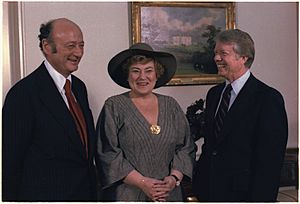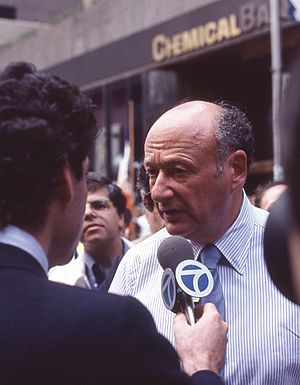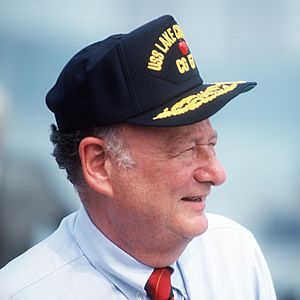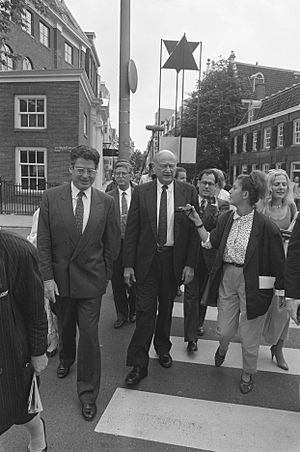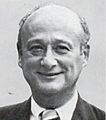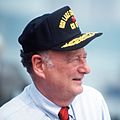Ed Koch facts for kids
Quick facts for kids
Ed Koch
|
|
|---|---|
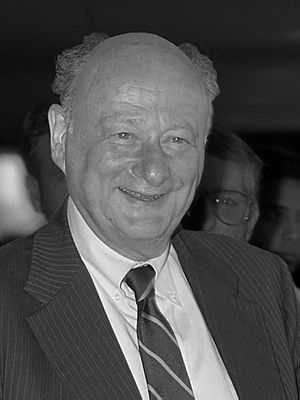
Koch in 1988
|
|
| 105th Mayor of New York City | |
| In office January 1, 1978 – December 31, 1989 |
|
| Preceded by | Abraham Beame |
| Succeeded by | David Dinkins |
| Member of the U.S. House of Representatives from New York |
|
| In office January 3, 1969 – December 31, 1977 |
|
| Preceded by | Theodore Kupferman |
| Succeeded by | Bill Green |
| Constituency |
|
| Member of the New York City Council from the 2nd district |
|
| In office January 1, 1967 – January 3, 1969 |
|
| Preceded by | Woodward Kingman |
| Succeeded by | Carol Greitzer |
| Personal details | |
| Born |
Edward Irving Koch
December 12, 1924 New York City, U.S. |
| Died | February 1, 2013 (aged 88) New York City, U.S. |
| Political party | Democratic |
| Education |
|
| Signature |  |
| Military service | |
| Branch/service | United States Army |
| Years of service | 1943–1946 |
| Rank | Sergeant |
| Unit | 104th Infantry Division |
| Battles/wars |
|
| Awards |
|
Edward Irving Koch (born December 12, 1924, died February 1, 2013) was an American politician and lawyer. He also worked as a commentator, film critic, and TV personality. Koch served in the United States House of Representatives from 1969 to 1977. He then became the mayor of New York City from 1978 to 1989.
Koch was a member of the Democratic Party his whole life. He often described himself as a "liberal with sanity." As mayor, he started a big program to improve public housing. He also worked to cut city spending and taxes. Koch was a strong supporter of Israel. He was the third Jewish mayor of New York City.
He was a popular person who often rode the New York City Subway. He would greet people on the street with his famous question, "How'm I doin'?"
Koch was first elected mayor of New York City in 1977. He won reelection in 1981 with 75% of the votes. He was the first New York City mayor to be supported by both the Democratic and Republican parties. In 1985, Koch was elected for a third term with 78% of the votes. His third term faced some challenges, including scandals involving his political friends. These problems never touched Koch personally. He lost the 1989 Democratic primary election to David Dinkins, who became the next mayor.
Contents
Ed Koch: A New York City Leader
Early Life and Military Service
Edward Koch was born in the Crotona Park East area of The Bronx, New York City. His parents, Yetta and Louis Koch, were Polish-Jewish immigrants. His family were Conservative Jews. As a child, he worked at a dance hall in Newark, New Jersey. He finished high school in Newark in 1941.
In 1943, Koch joined the United States Army. He served as a soldier in the 104th Infantry Division. He landed in Cherbourg, France, in September 1944. He received several awards for his service in World War II. These included the European-African-Middle Eastern Campaign Medal. He also earned the World War II Victory Medal and the Combat Infantryman Badge.
After the war ended in Europe, Koch was sent to Bavaria. He could speak German, so he helped remove Nazi officials from their jobs. He found non-Nazis to take their places. He left the army as a Sergeant in 1946.
Koch then returned to New York City for college. He attended City College of New York, graduating in 1945. He later earned his law degree from New York University School of Law in 1948. He worked as a lawyer for many years. Koch became active in New York City politics. He was a reformer who opposed the old political system known as Tammany Hall. In 1967, Koch became a member of the New York City Council.
Becoming a Congressman
In 1968, Koch ran for a seat in the U.S. Congress. He won the election and became a U.S. Representative for New York. He served in the United States House of Representatives from January 3, 1969, to December 31, 1977. He resigned from Congress to become the Mayor of New York City.
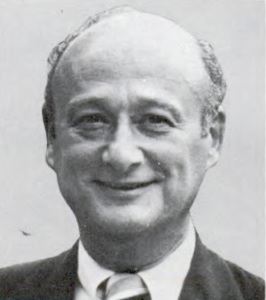
Koch started his political career as a "plain liberal." He was against the Vietnam War and marched for civil rights. Over time, his views began to change. He started to call himself a "liberal with sanity." This shift happened after he saw how a plan for a large housing project affected a middle-class community. Koch listened to the residents and spoke out against the plan. This surprised some of his liberal friends.
Running for Mayor
Koch ran for mayor of New York City in 1973, but he dropped out early. In 1977, he announced his campaign again. He ran against the current mayor, Abraham Beame, and future governor Mario Cuomo. Koch and Cuomo were the top two in the Democratic primary. Koch then defeated Cuomo in a runoff election.
Koch campaigned on a platform of "law and order." This meant focusing on public safety and reducing crime. The New York City blackout of July 1977 and the riots that followed helped Koch's message. People wanted public safety restored, and Koch became a leading candidate.
Ed Koch as Mayor of New York City
First Term as Mayor
When Koch became mayor, New York City was facing big challenges. There was high crime, a major blackout, and money problems. During his first term, Koch took steps to save money. He also worked with city worker unions. These actions helped improve the city's finances.
During his first term, several important events happened. The singer John Lennon was sadly assassinated. New Yorkers were very sad for days after. Koch also dealt with a transit strike. He also helped bring the 1980 Democratic National Convention to New York City. The city also started a sister city relationship with Beijing, China.
Second Term as Mayor
In his second term, the Brooklyn Bridge celebrated its 100th anniversary. Koch appointed Benjamin Ward as the city's first African American police commissioner in 1983. During this time, AIDS also became a serious public health issue. There was also a lot of media attention on Bernhard Goetz's shooting of four teenagers in the subway in 1984. The United Nations also celebrated its 40th anniversary.
Koch often had different ideas from typical liberal politicians. He supported the death penalty. He added 3,500 police officers to the NYPD in the 1980s. He also took a strong stand on "quality of life" issues. For example, he gave police more power to deal with homeless people. He also signed a law banning radios on subways and buses. These ideas sometimes led to criticism from groups like the American Civil Liberties Union.
In 1984, Koch published his first book, Mayor. It became a best-seller. The book was later turned into a musical called Mayor.
Third Term as Mayor
In 1986, Koch signed a law protecting the rights of lesbian and gay people in the city. This law was passed by the City Council after 15 years of trying. Also in 1986, Koch took part in Hands Across America. He also celebrated the Statue of Liberty's 100th anniversary.
Koch always showed a strong love for New York City. Sometimes, this love seemed extreme to others. For example, in 1984, he was against creating a second telephone area code for the city. He said it would divide the city's people. When the National Football League's New York Giants won Super Bowl XXI in 1987, he refused to let them have a victory parade in the city. He famously joked, "If they want a parade, let them parade in front of the oil drums in Moonachie!" (Moonachie is a town in New Jersey near where the Giants play).
In his third term, Koch's popularity decreased. This was due to a series of corruption scandals. These scandals involved some of his political friends. There were no claims that Koch gained money from the corruption. However, the scandals made people question his promise of a government free of special favors.
In 1988, Koch became a controversial figure in the presidential campaign. He publicly criticized Democratic candidate Jesse Jackson. Koch reminded voters of some of Jackson's past statements. He said that Jewish people would be "crazy" to vote for Jackson. Koch supported another candidate, Senator Al Gore.
In 1989, Koch ran for a fourth term as mayor. No mayor had ever won a fourth term before. He lost the Democratic primary election to David Dinkins. Dinkins became the next mayor.
After Being Mayor
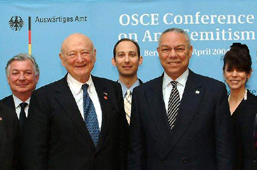
After leaving office, Koch continued to be active. He became a partner in a law firm. He also became a commentator on politics. He reviewed movies and restaurants for newspapers, radio, and television. He taught at New York University (NYU). He was also a judge on the TV show The People's Court for two years. Koch often gave speeches and had a popular radio talk show. He also hosted his own online movie review show, The Mayor at the Movies.
A street in southern Tel Aviv, Israel, was named after Koch in 1993.
In 2004, Koch wrote a children's book with his sister, Pat Koch Thaler. The book was called Eddie, Harold's Little Brother. It tells the story of Koch's childhood. He tried to be good at baseball like his older brother Harold, but he wasn't. He then realized he was good at telling stories and speaking in public.
The New York City Council voted to rename the Queensboro Bridge the Ed Koch Queensboro Bridge in 2011.
"Mayor at the Movies"
Koch started reviewing movies for an online show called Mayor at the Movies in 2009. He loved going to the movies and often saw two or three films a weekend. He preferred to watch movies with a public audience. People were often surprised to see him there. His reviews were honest and funny. He rated movies with a "plus" for a good film or a "minus" for a bad one. He especially loved documentaries and movies about Jewish topics.
He also enjoyed independent films, dramas, and action movies. His film reviews were also published in The Huffington Post and The Villager newspaper. Koch also appeared as himself in more than 60 Hollywood films and TV shows. These included Sex and the City and Spin City. He even hosted Saturday Night Live. A documentary about his life, Koch, was released in 2013.
Health and Passing
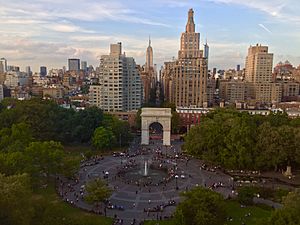
Koch had a mild stroke in 1987. However, he was able to return to his duties as mayor within about a week. After his time as mayor, he had some heart problems. He was often in the hospital in the last few months of his life.
On January 31, 2013, he was admitted to Columbia University Irving Medical Center. He died from heart failure at 2 a.m. the next day, at age 88. His funeral was held on February 4, 2013, at Temple Emanu-El in Manhattan. Because of Koch's strong support for Israel, the Israeli Consul-General spoke at the service. Former president Bill Clinton also spoke. New York City Police Department helicopters flew over the service.
Koch bought a burial plot in Trinity Church Cemetery in 2008. He wanted to be buried in Manhattan. He chose to put the last words of journalist Daniel Pearl on his tombstone: "My father is Jewish, my mother is Jewish, I am Jewish."
Famous Sayings
Koch was known for his quick wit and funny one-liners. Here are a few examples:
- (After losing the primary election to David Dinkins) "The people have spoken... and they must be punished."
- "I'm the sort of person who will never get ulcers. Why? Because I say exactly what I think. I'm the sort of person who might give other people ulcers."
- "If you agree with me on nine out of 12 issues, vote for me. If you agree with me on 12 out of 12 issues, see a psychiatrist."
Images for kids
See also
 In Spanish: Ed Koch para niños
In Spanish: Ed Koch para niños
 | Aurelia Browder |
 | Nannie Helen Burroughs |
 | Michelle Alexander |


